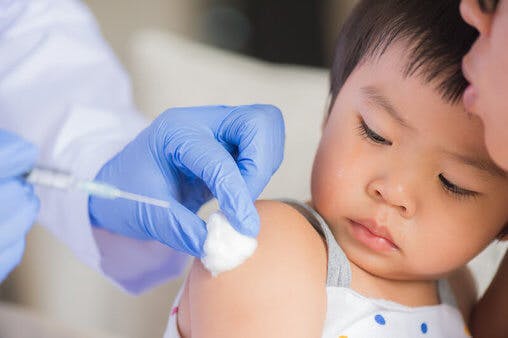MMR Vaccine: Special Situations in Vaccine Practices

Question
I am a missionary living in the Dominican Republic. Yesterday our eight-month old son received a vaccination for sarampion, which is the Spanish term for measles. My baby book says that it is better not to vaccinate for measles until after a child is 12 months old because the vaccination usually doesn't make a child immune to the disease until after the child is a year old. Measles is quite a problem here among children and for that reason my son's doctor requires the vaccination at eight months. The doctor, a Dominican, was trained in the States. I am curious to know, however, if you feel that it was wise for our son to have received the vaccination at the age of eight months rather than waiting until after he turns a year old and the vaccination is more effective.
Beth Veenstra - Santo Domingo, Dominican Republic
Dr. Greene`s Answer
As you’ve discovered in your baby book, the standard immunization schedule for MMR is to do the first immunization between 12 and 15 months of age. Beth, you are right that immunization is less effective before 12 months. Still, your pediatrician’s idea of giving the measles vaccine at eight months in a situation where measles is very common makes sense and is now part of the Advisory Committee on Immunization Practices (ACIP) recommendations. The immunization should, however, be repeated between 12 and 15 months of age and again between 4 and 6 years old, in order to ensure full protection later. Experts agree that even though an earlier dose is less effective than a later one, in a situation like yours, the extra dose does nothing but provide early protection — if the normal dose is still given at the appropriate time.
MMR Vaccine and the Guidelines
Standard guidelines and practices are an important part of modern medicine. They have helped to elevate our health and provide a framework in which we can evaluate how well we are doing in particular areas.
The example of your physician’s stepping outside of the routine, and your questioning of it, is an excellent illustration of how guidelines should be used — to delineate what is best for the most common situations, but not to inhibit us from thinking specifically about each individual child.
Question
I read that you should not vaccinate for MMR if your child has an egg allergy. I found out that my 17-month baby girl gets a rash from egg whites. What kind of problems can occur when she receives the MMR vaccine? Should she not have it?
Dr. Greene’s Answer
The current measles-mumps-rubella vaccine (MMR) does not contain a significant amount of egg proteins (but two other vaccines do). The MMR vaccine is actually grown in chick embryo fibroblast cultures, which do not contain a significant amount of egg protein. As recently as 1994, the AAP recommended skin testing of all children with severe egg allergies before they received the MMR. This is no longer necessary. Even those with dramatic egg allergies are extremely unlikely to have an anaphylactic reaction to the MMR. The benefits of the vaccine far outweigh the risks.
MMR Vaccine and Egg Allergies
A recent study done by the CDC found anaphylactic reactions from all vaccines occurred at a rate of just 1.31 per million– a very low risk! However, for those with egg allergies, it is important to know that the influenza and yellow fever vaccines do contain egg protein.
Most people are not aware that some influenza vaccines contain egg protein. However, an egg allergy does not necessarily mean that one can not receive the influenza vaccine. In fact, the Centers for Disease Control and Prevention (CDC) still recommends the influenza vaccine for people with egg allergies who experience only hives, given that the risk of serious allergic reactions in this population of patients is very low. For people with other allergic reactions from eggs (such as facial or body swelling, breathing difficulties, or vomiting), the CDC recommends only receiving the influenza vaccine in a hospital or clinic setting with health care providers who are trained to recognize and treat any potential allergic reactions. Those with a previous severe allergic reaction to the influenza vaccine, regardless of the component suspected of being responsible for the reaction, should not receive any further doses of the influenza vaccine.
In the 2020-2021 season, there were two flu vaccines that were considered egg-free (Flublok Quadrivalent for use in those 18 years and above, and Flucelvax Quadrivalent for use in those 4 years and above).
The yellow fever vaccine also contains egg protein. Yellow fever is still a major problem for people living in or traveling to tropical South America or Africa. This vaccine can be very important if you are planning travel to those areas. Thus, rather than skipping it, most candidates for the vaccine who have a suspected allergy should get a series of two skin tests with the vaccine. If both tests are fine, proceed with the vaccine. If either test shows a reaction, a process of desensitization is begun. Similar to allergy shots, a series of tiny doses of vaccine are given to reduce the risk of reaction.
Although egg protein in the MMR is no longer a big problem, if your child has severe allergies with systemic symptoms, whatever the cause, it pays to become familiar with the hidden ingredients found in products of all kinds.
References and Resources
Cancado, Barbara et al. Yellow fever vaccine and egg allergy. The Lancet, Infectious Diseases. 2019: 19(8).
Khakoo GA, Lack G. Recommendations for using MMR vaccine in children allergic to eggs. BMJ. 2000;320(7239):929-932.


